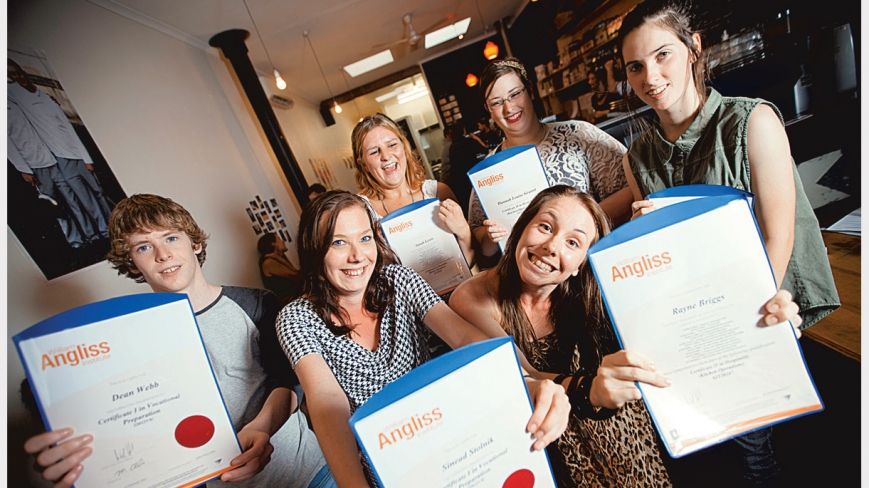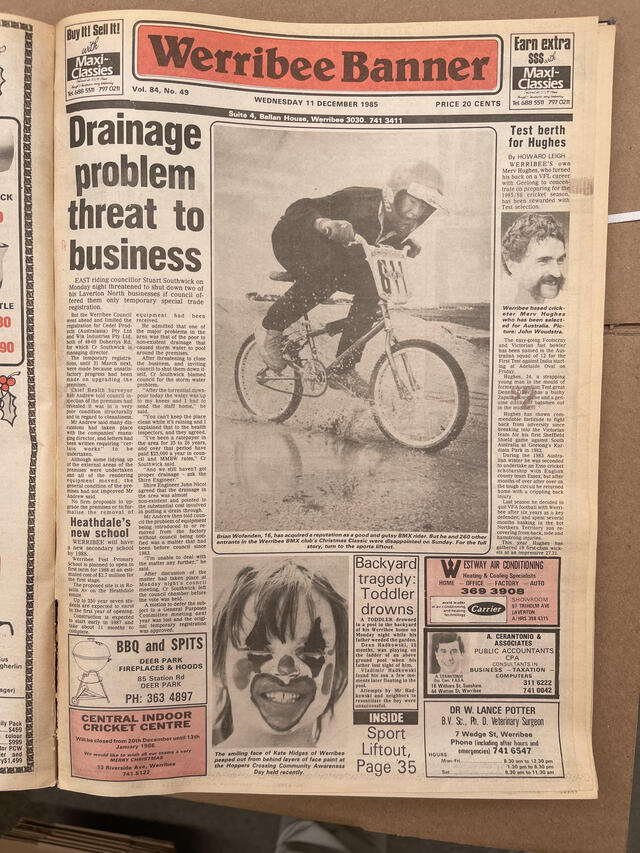Reporter Daniel Paproth spends a day in the kitchen at an extraordinary business giving homeless youth a chance to get back on their own feet
It is just after the morning rush at the Streat cafe on Racecourse Road in Flemington and I am in the kitchen, preparing food, hopelessly out of my depth.
Trainee Pnina, on the other hand, is far more confident. She is in her second month at Streat, a non-profit social enterprise that aims to reduce youth homelessness by providing them with hospitality training.
Pnina and I are making chimichurri, a sauce for grilled meats, and we are carefully washing parsley and taste-testing the mixture.
Pnina asks if I have had experience in a cafe. I haven’t – it takes me an hour just to make bangers and mash.
Streat is the brainchild of youth rights advocate Rebecca Scott, who co-founded the operation with partner Kate Barrelle in 2008.
Two years later they rolled their first food cart out to Federation Square and Streat’s business exploded.
There are now two cafes, in McKillop Street in the CBD and on Racecourse Road, as well as a coffee cart at Melbourne Central.
In 2012 Streat acquired the Social Roasting Company, a coffee roasting business.
Since 2010, 52 young people aged 16–25 have been involved in the program, and more than 50 per cent have graduated with a certificate.
Of those, 17 have gone on to work in the hospitality industry – two now work as fully qualified chefs – and several others have gone on to other work or further study.
It all started when Scott discovered KOTO, a street youth cafe in Hanoi, Vietnam, staffed mostly by former homeless youth who received training through the program.
‘‘It sounds daggy but I had my little epiphany,’’ Scott says. ‘‘That lightbulb moment was about realising that you can solve social issues like homelessness through business. Social change is actually happening within the business itself.’’
The reason for the expansion is simple. ‘‘The bigger we get the more young people we can put through,’’ Scott says.
‘‘There are so many skills and competencies that a young person can get in a cafe like this, from front of house to barista to a chef out back.’’
Hard at work in the kitchen, Pnina tells me about a very brave decision she made at the age of 18. Estranged from her family, she left home in Sydney and came to Melbourne by herself.
‘‘I threw up at the airport,’’ the 21-year-old recalls. ‘‘I knew no one but I wanted my independence so I just did it and never looked back.’’
It was Pnina’s Jewish faith that helped her adjust to the change as she made connections through Merkos Women, a Jewish learning centre for women.
In the kitchen, we continue to wash the herbs, cut the parsley and strip tiny oregano leaves from their stems for the chimichurri.
There is something very calming about it despite the fast pace of the kitchen.
‘‘I find cooking relaxing,’’ Pnina says. ‘‘The whole process. It’s what I like to do when I get upset.’’
Pnina and the other trainees spend an average of three days a week involved with Streat.
One day is spent on site at the cafe, another at William Angliss TAFE and a third at the Streat office in Bourke Street completing a life skills component.
Christie is another trainee at Streat this morning. A mother of two, she is quietly spoken but reveals a story of incredible determination.
The 21-year-old left home when she was 16 and spent the next two years in refuge homes while balancing the latter years of high school.
In year 12, at 18, she found out she was pregnant with her first child, daughter Melody.
‘‘I left school and I left the refuge because they weren’t able to support me any more,’’ she says. ‘‘I went to stay with mum but she said I couldn’t stay there with the baby.’’
Christie was eight months pregnant at the time. She spent a little over a week in another refuge before finding transitional and then long-term accommodation. It was traumatic, she says, but has helped put life into perspective.
‘‘At the time I was all over the place. Now I look back and it’s hard to explain … you don’t realise how much you went through. You see life differently when you go through something like that.’’
Christie arrived at Streat on the advice of her social worker, and though she previously had no interest in hospitality she has grown to love it.
‘‘I’m finding it fun and I do want to get a job in it,’’ she says. ‘‘I feel way more confident now than I was when I started the program. I feel like I can actually do something with myself.’’
Back to the chimichurri; the parsley and oregano have been prepared and it’s time to blend it with canola oil. I have a taste and it is quite sour. It’s here I learn a vital culinary rule.
The key to successful cooking is in the small details – the salt, pepper and oil. Pnina deftly saves the chimichurri with a few pinches of salt and we’re away again.
As the clock nears midday the kitchen gets busier. Head chef Rob Auger enlists Pnina to make the multitude of burgers that have just been ordered as the Nepalese chef Hari Dhakal and I get to work making reserves of aioli.
Just like the chimichurri, the secret is adding the right amounts of salt – and not overdoing the garlic.
The Streat kitchen is about as far as you can get from the likes of Gordon Ramsay’s Hell’s Kitchen.
When lunch orders come in there is no barking of commands from Auger, nor does Pnina crack under the stress.
The two work together, Auger guiding Pnina on how best to present the burgers. The mutual respect is crucial – Pnina has had negative cafe experiences before Streat.
“I was doing my best,” Pnina says. “And the lady called me deaf and stupid the whole time because I wasn’t good with the cash register or with other things. I got a lot of put-downs.
‘‘When I first started at the McKillop Streat cafe, every morning I’d be like ‘I don’t wanna go in’ but when I got there they were always really nice and made me feel really welcome.
I’m really confident with the cash register now and I know how to hold a knife properly.’’ Christie agrees.
‘‘It’s important because if you don’t know something you don’t feel afraid to ask because they’re not going to judge you.’’ The night before my shift in the Streat kitchen, the cafe hosted a graduation ceremony for the class of 2012.
Scott made a speech toasting the graduates and called each one up to receive their certificates as tears were shed and smiles broke out across the room.
It’s easy to admire Scott’s work, given the way she has made an idea a successful reality, but it’s the trainees she admires most.
‘‘I love it when I know the back story of a young person who might be serving me,’’ she says. ‘‘I know the extraordinary hurdles they have overcome to even be standing in this cafe.
“As a customer you wouldn’t know that but we did, and it’s an amazing transformation that you see happening before your eyes.
‘‘These guys are my heroes. They totally rock. I don’t know if I’d ever have the courage or resilience to do the things that they’ve done to get here.’’
Take Hannah, for example. Five years ago, when she was 16, Hannah was diagnosed quadriplegic.
She couldn’t walk and had to get a year 12 equivalent through VCAL because the many high schools she attended could not provide the disabled access she needed.
‘‘When I was diagnosed as a quadriplegic, the doctors were convinced I was going to die,’’ she says.
‘‘So they sent me home for palliative care and then my father abandoned me in hospital to die.’’ She then spent two-and-a-half years in an aged care facility, which she describes as a ‘‘very nasty place to live’’.
‘‘They were taking in people of a level they couldn’t care for, like drug addicts or people with severe mental issues.’’ Fast-forward to March 2013 and Hannah has successfully completed the Streat course with a Certificate II in Hospitality, is walking again with the aid of a cane, has recently started a Bachelor of Communications (Advertising) at RMIT and is living in one of Lighthouse Foundation’s houses in Richmond.
‘‘It was great to come through the fire,’’ she says. “[Streat] really supported me with my disability and it adds a lot of support to my life and gives me a background. I’ve got a fallback if I struggle to get work.’’
Aaron is another of the graduates who has turned his life around. Two-and-a-half years ago he was diagnosed with drug-induced psychosis, having used marijuana since he was 14.
He experienced homelessness from a young age, which contributed to the drug use, and has been in and out of hospital.
But he graduated last year, no longer uses drugs, works at the Doutta Galla Hotel in Flemington and is living on his own in Glenroy.
His recipe for bread and butter pudding – a meal his nan made him many times – features in the 160-page hardcover Streat recipe book.
There is a quote from Aaron in the book – ‘‘Just because you have a hard life doesn’t mean you have no future – the sky is the limit!’’ ‘‘You don’t really look back on your past,’’ he says.
‘‘You don’t dwell on it. The past is the past, it just made me a stronger and better person. I’ve come a long way.’’
Visit a Streat cafe at 307 Racecourse Road, Flemington, 5 McKillop Street, city, or at Melbourne Central. Details: visit streat.com.au.







